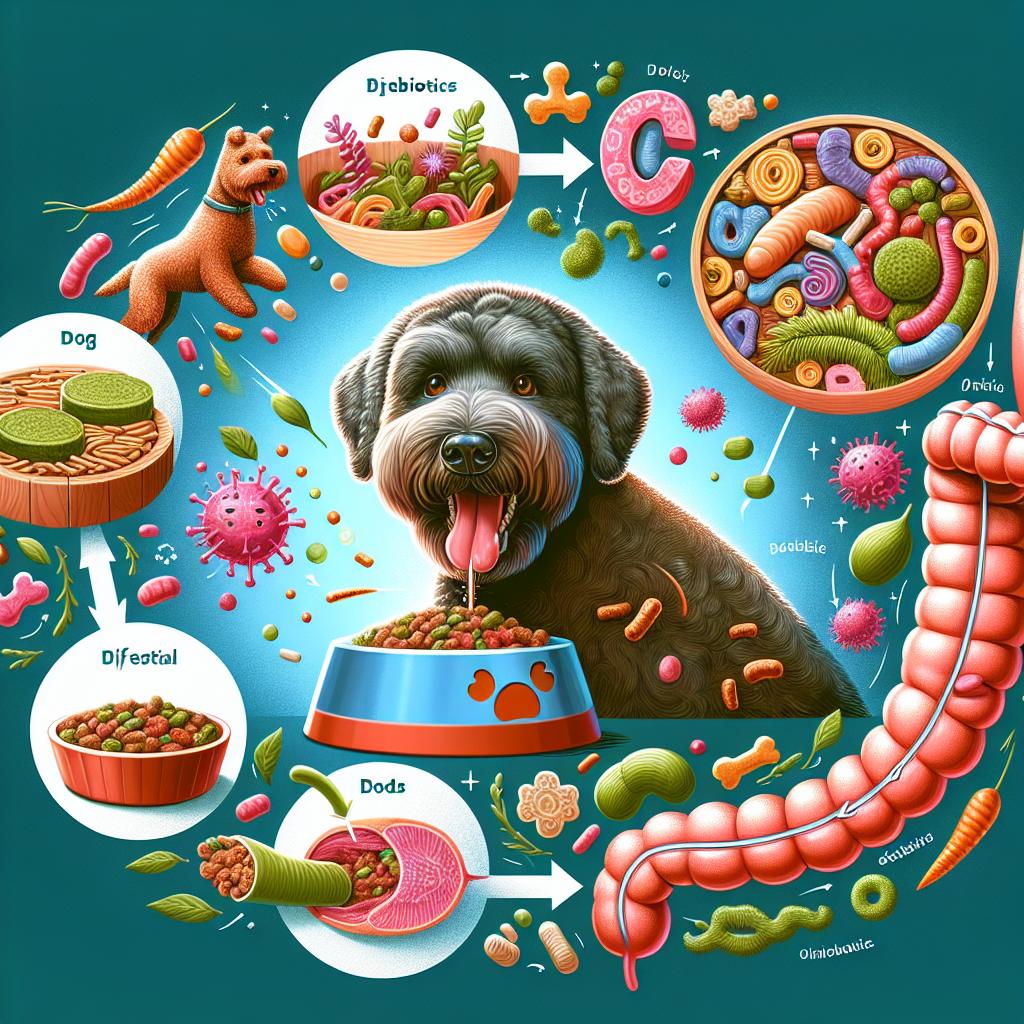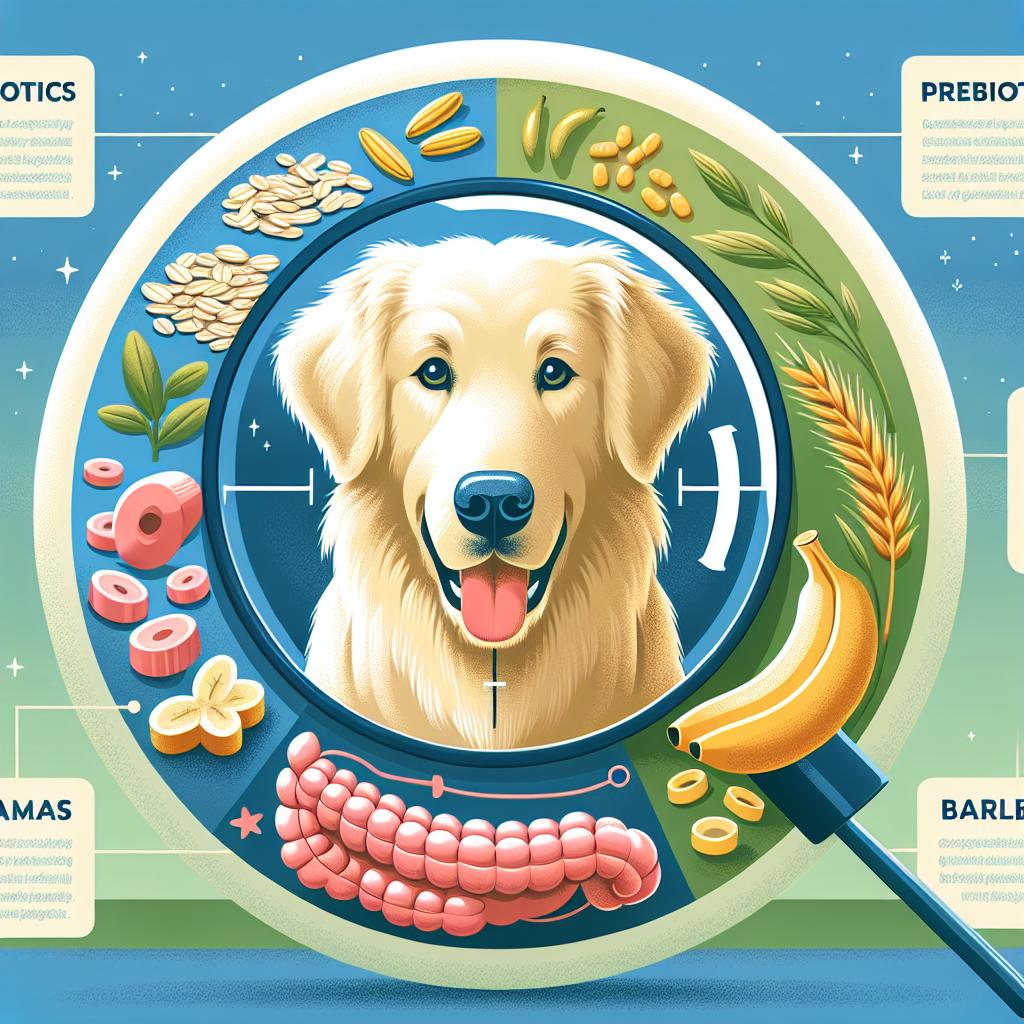In the ever-evolving landscape of pet nutrition, where the quest for optimal health mirrors advancements in human diets, prebiotics have emerged as unsung heroes in the canine culinary world. Just as we are learning to appreciate the importance of gut health and its far-reaching effects on overall well-being, our furry companions are no exception. Prebiotics, often overshadowed by probiotics and trendy superfoods, play a pivotal role in enhancing the nutritional profiles of our dogs’ diets. These plant-based fibers may not be as glamorous as they sound, but their influence on digestion, immune function, and even behavior is nothing short of remarkable. Join us as we explore the intriguing role of prebiotics in dog nutrition, unraveling the science behind these essential nutrients and their transformative impact on the health of our four-legged friends.
Understanding Prebiotics and Their Importance for Canine Health
Prebiotics serve as essential nutrients that support the growth and activity of beneficial gut bacteria in dogs. Unlike probiotics, which are live microorganisms, prebiotics are non-digestible fibers that act as food for the good bacteria already present in the intestines. Incorporating prebiotics into your dog’s diet can help maintain a balanced gut microbiome, leading to improved digestion, enhanced immunity, and better overall health. Some common sources of prebiotics that can be included in canine diets are:
- Inulin – Found in chicory root and garlic, promotes healthy gut flora.
- Fructooligosaccharides (FOS) – Derived from fruits and vegetables, aids digestion.
- Galactooligosaccharides (GOS) – Obtained from legumes, supports gut health.
The importance of prebiotics extends beyond gastrointestinal health. A healthy gut microbiome contributes to the production of essential nutrients, such as vitamins and short-chain fatty acids, which play pivotal roles in maintaining a dog’s energy levels and overall vitality. Moreover, a well-balanced gut environment can help mitigate issues such as allergies and skin conditions, which are often exacerbated by poor nutrition or imbalanced gut bacteria. To better understand the benefits, consider the following comparison of prebiotics and probiotics:
| Feature | Prebiotics | Probiotics |
|---|---|---|
| Type of Substance | Non-digestible fiber | Live microorganisms |
| Function | Feeds beneficial bacteria | Adds beneficial bacteria |
| Primary Benefit | Supports gut health | Restores gut flora balance |

The Impact of Prebiotics on Digestive Wellness in Dogs
Incorporating prebiotics into a dog’s diet can lead to a significant improvement in digestive wellness. Prebiotics serve as a food source for beneficial gut bacteria, helping them thrive and flourish. A balanced gut microbiome plays a crucial role in various aspects of health, which can include:
- Enhanced Nutrient Absorption: Prebiotics assist in breaking down food more effectively, boosting the absorption of essential vitamins and minerals.
- Reduced Gastrointestinal Issues: Regular intake of prebiotics may alleviate common digestive problems like bloating, gas, and irregular bowel movements.
- Immune Support: A healthy gut can improve your dog’s immune response, reducing the risk of infections and diseases.
Furthermore, prebiotics help maintain a favorable pH level in the intestines, which can inhibit the growth of harmful bacteria. This protective mechanism contributes to a more stable digestive environment. Some notable sources of prebiotics suitable for canine consumption include:
| Prebiotic Source | Benefits |
|---|---|
| Inulin | Promotes beneficial bacteria growth and supports digestion. |
| FOS (Fructooligosaccharides) | Boosts gut health and enhances nutrient absorption. |
| Oligosaccharides | Helps regulate bowel movements and improve gut flora balance. |
Including these prebiotic-rich ingredients in your dog’s diet can lead to enhanced digestive health and overall vitality. By understanding the benefits of prebiotics, dog owners can make informed dietary choices that support their furry companions’ long-term wellness.

Choosing the Right Prebiotic Sources for Your Dogs Diet
When selecting prebiotic sources for your dog’s diet, it’s essential to consider ingredients that not only promote gut health but also align with your dog’s individual needs. Some of the most effective prebiotics include:
- Inulin: Found in chicory root, inulin is a soluble fiber that helps stimulate the growth of beneficial bacteria.
- Fructooligosaccharides (FOS): These are derived from fruits and vegetables and can have a positive impact on your dog’s digestive system.
- Beet Pulp: A byproduct of sugar beet processing, beet pulp provides both soluble and insoluble fibers.
- Oligofructose: Sourced from various plants, this prebiotic assists in balancing the intestinal flora.
- Apple Pomace: This is a fiber-rich byproduct of apple juice that offers both prebiotic benefits and nutrient content.
Equally important is the incorporation of these prebiotic sources in appropriate quantities suitable for your dog’s size, age, and health requirements. The following table outlines common prebiotic sources along with their benefits and suggested serving sizes:
| Prebiotic Source | Benefits | Recommended Serving Size |
|---|---|---|
| Inulin | Boosts beneficial bacteria | 0.5 – 1g per meal |
| FOS | Enhances digestive health | 1 - 3g per meal |
| Beet Pulp | Supports regular digestion | 10 – 15g per day |
| Oligofructose | Improves gut health | 1 - 2g per meal |
| Apple Pomace | Rich in fiber | 5 – 10g per day |

Integrating Prebiotics into Your Dogs Daily Nutrition Plan
Incorporating prebiotics into your dog’s daily diet can significantly enhance their overall health and digestion. These non-digestible fibers act as food for beneficial gut bacteria, leading to a balanced microbiome. When selecting prebiotic sources, consider the following options:
- Chicory Root: A rich source of inulin, chicory root can be easily mixed into dog food.
- Beet Pulp: This fibrous ingredient not only aids digestion but also provides essential nutrients.
- Psyllium Husk: Known for its ability to promote gut health, it can help regulate your dog’s digestion.
- Green Bananas: A natural source of resistant starch that supports healthy gut flora.
It’s important to introduce prebiotics gradually into your dog’s nutrition to prevent any digestive upset. Start by adding a small amount of your chosen prebiotic and monitor your dog’s response. Adjust the portion over time based on their tolerance and needs. A simple tracking table can be helpful:
| Prebiotic Source | Recommended Daily Amount | Benefits |
|---|---|---|
| Chicory Root | 1 teaspoon | Supports digestion and boosts beneficial bacteria |
| Beet Pulp | 1 tablespoon | Improves bowel regularity and nourishes gut |
| Psyllium Husk | 1/2 teaspoon | Regulates digestion and can alleviate constipation |
| Green Bananas | 1 tablespoon | Rich in resistant starches that promote healthy gut flora |
Q&A
Q&A: The Role of Prebiotics in Dog Nutrition
Q1: What are prebiotics, and how do they differ from probiotics?
A: Prebiotics are non-digestible food components that promote the growth of beneficial bacteria in the gut. Think of them as the fertilizer that helps your probiotic “good bacteria” flourish. In contrast, probiotics are live microorganisms that provide health benefits when consumed in adequate amounts. While both are vital for gut health, prebiotics serve as the nourishment that supports the growth of those helpful organisms.
Q2: Why are prebiotics important for my dog’s diet?
A: Just like in humans, a balanced gut microbiome is crucial for a dog’s overall health. Prebiotics help maintain this balance by promoting the growth of beneficial gut bacteria. This can support digestion, boost the immune system, and potentially reduce the risk of gastrointestinal issues. By incorporating prebiotics into your dog’s diet, you’re laying the foundation for a healthier digestive tract.
Q3: What are some common sources of prebiotics that I can find in dog food?
A: Prebiotics can often be found in certain ingredients, such as chicory root, beet pulp, and various fibers like inulin. Many high-quality dog foods are formulated with these ingredients to enhance gut health. Additionally, sweet potatoes and bananas are excellent natural sources of prebiotics that you can consider adding to your dog’s homemade meals or treats.
Q4: How do I know if my dog needs more prebiotics in their diet?
A: Signs that your dog may benefit from enhanced prebiotic intake include digestive issues such as diarrhea, flatulence, or an unbalanced appetite. If your dog frequently experiences these problems, it might be worth discussing with your veterinarian. A diet rich in prebiotics can help alleviate these symptoms and promote a healthier digestive environment.
Q5: Can I give my dog prebiotic supplements? Are they safe?
A: Yes, prebiotic supplements are available and can be beneficial, especially if your dog has specific digestive health needs. However, it’s crucial to choose high-quality products and consult with your veterinarian before introducing any new supplements. Just like with food, moderation is key, as an excessive amount of prebiotics may lead to digestive upset.
Q6: Are there any potential risks associated with prebiotics in dog nutrition?
A: While prebiotics are generally safe for dogs, introducing them suddenly or in large quantities can lead to gastrointestinal upset, including gas or bloating. Always start with small amounts when incorporating prebiotics into your dog’s diet and monitor their response. If any adverse reactions occur, consult your veterinarian for guidance.
Q7: How can I incorporate more prebiotics into my dog’s diet?
A: You can consider switching to a dog food brand that lists prebiotic sources in the ingredients. Additionally, incorporating small amounts of prebiotic-rich foods like pumpkin, apples (without seeds), or even yogurt can be a tasty way to enhance your dog’s nutrition. Always introduce new foods gradually and observe how your dog reacts.
Q8: how significant is the role of prebiotics in my dog’s health?
A: Prebiotics play a pivotal role in promoting a healthy gut, which is essential for your dog’s overall well-being. By supporting the growth of beneficial gut bacteria, prebiotics can aid digestion, enhance immune function, and improve your dog’s quality of life. Integrating them into your dog’s nutrition can be a simple yet impactful way to ensure their long-term health.
In Retrospect
the role of prebiotics in dog nutrition cannot be overstated; they are a vital component in promoting gut health and enhancing overall well-being for our four-legged companions. As we continue to unravel the complexities of canine diets, incorporating prebiotics offers us a promising avenue for improving digestive function, boosting immunity, and ensuring optimal nutrient absorption. With a deeper understanding of how these fibers work synergistically within a dog’s diet, we can make informed choices that lead to happier, healthier pets. As we move forward, let us keep exploring the nuances of dog nutrition, always prioritizing what best serves our loyal friends. After all, a healthy gut means a happier pup—and that is a goal worth striving for.

